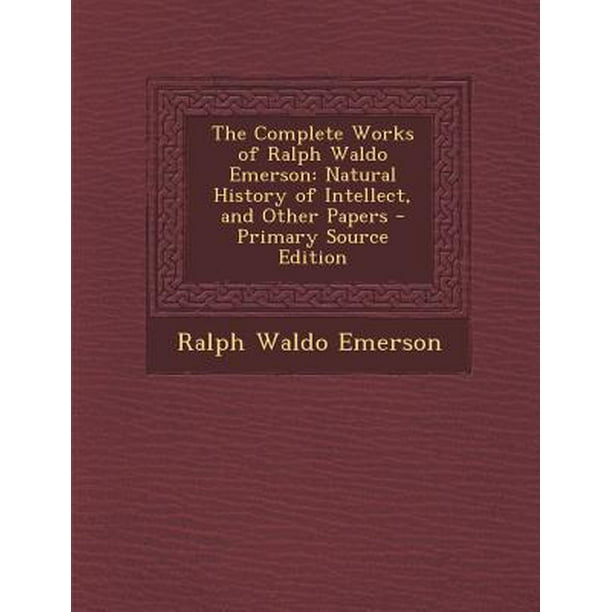
Emerson's first substantial publication was a volume of Essays that issued from the presses in There were twelve essays in this volume the very first being one entitled "History". This essay sets out a transcendentalist approach to History where the "innate Humanity" that is common to all of mankind is seen as operating throughout the ages in the shaping of events Short Summary of “History” by Ralph Waldo Emerson. Article shared by. As per Ralph Waldo Emerson, human history is only a record of how every man discovered or rediscovered the principles of universal mind which pre-existed in human mind as laws. Without hurry, without rest, the human spirit goes forth from the beginning to embody every faculty, every thought, and every emotion, which Offer appreciation for the life and work of Ralph Waldo Emerson. Menu. Centenary Edition – The Complete Works of Ralph Waldo Emerson – blogger.com; Essays I. I. History: II. Self-Reliance: III. Compensation: IV. Spiritual Laws: V. Love: VI Friendship: VII. Natural History of the Intellect and Other Papers. Natural History of Intellect
Commitment to Privacy - Virginia Commonwealth University
Ralph Waldo Emerson wrote several books of essays, commonly associated with transcendentalism and romanticism. Some of the most notable essays of these two collections are Self-RelianceCompensationemerson history essay, The Over-SoulCirclesThe PoetExperienceand Politics. Emerson later wrote several more books of essays including Representative MenEnglish Traitsemerson history essay, The Conduct of Life and Society and Solitude, emerson history essay.
Emerson's first published essay, Naturewas published inbefore the first and second series. From Wikipedia, the free encyclopedia. Collection of essays related to transcendentalism and romanticism by Ralph Waldo Emerson. Denmark England literature France literature Germany Norway Poland Russia literature Scotland Spain literature Sweden literature. Bohemianism Coppet group Counter-Enlightenment Dark romanticism Düsseldorf School Gesamtkunstwerk Gothic fiction Gothic Revival architecture Hudson River School Indianism Jena Romanticism Lake Poets Nazarene movement Ossian Romantic hero Romanticism and Bacon Romanticism in science Romantic nationalism Romantic poetry Opium and Romanticism Transcendentalism Ultra-Romanticism Wallenrodism.
Abovian Abreu Alencar Alfieri Alves Andersen A. Arnim B. Arnim Azevedo Baratashvili Baratynsky Barbauld Aikin Batyushkov Baudelaire Bécquer Beer Bertrand Blake Botev Brentano Bryant Burns Byron Castelo Branco Castilho Chateaubriand Chavchavadze Clare Coleridge Cooper De Quincey Dias Dumas Eichendorff Emerson Eminescu Espronceda Fouqué Foscolo Frashëri Fredro Freire Garrett Gautier Goethe Grimm Brothers Günderrode Gutiérrez Gutzkow Hauff Hawthorne Heine Heliade Herculano Hoffmann Hölderlin Hugo Kostić Irving Isaacs Jakšić Jean Paul Karamzin Keats Kleist Krasiński Küchelbecker Lamartine Landor Lenau Leopardi Lermontov Emerson history essay Lowell Macedonski Macedo Mácha Magalhães Malczewski Manzoni Maturin Mérimée Mickiewicz Mörike Musset Nalbandian Nerval Njegoš Nodier Norwid Novalis Oehlenschläger O'Neddy Orbeliani Poe Polidori Potocki Prešeren Pushkin Raffi Saavedra Sand Schiller Schwab Scott Seward M, emerson history essay.
Shelley P. Shelley Shevchenko Słowacki Southey De Staël Stendhal Tieck Tyutchev Uhland Varela Vörösmarty Vyazemsky Wergeland Wordsworth Zhukovsky Zorrilla. Adam Alkan Auber Beethoven Bellini Bennett Emerson history essay Bertin Berwald Busoni Emerson history essay Bruch Bruckner Cherubini Chopin Czerny Félicien David Ferdinand David Donizetti Dvořák Elgar Fauré Field Franck Franz Glinka Grieg Gomis Halévy Hummel Joachim Kalkbrenner Liszt Loewe Mahler Marschner Masarnau Medtner Méhul Fanny Mendelssohn Felix Mendelssohn Méreaux Meyerbeer Moniuszko Moscheles Moszkowski Mussorgsky Niedermeyer Onslow Paganini Paderewski Prudent Rachmaninoff Reicha Rimsky-Korsakov Rossini Rubinstein Saint-Saëns Schubert Clara Schumann Robert Schumann Scriabin Sibelius Smetana Sor Spohr Spontini Richard Strauss Tchaikovsky Thalberg Verdi Voříšek Wagner Weber Wolf.
Theologians and philosophers. Barante Belinsky Berchet Chaadayev Coleridge Constant Díaz Emerson Feuerbach Fichte Goethe Hazlitt Hegel Hunt Khomyakov Lamennais Larra Mazzini Michelet Müller Pellico Quinet Ritschl Rousseau Schiller A.
Schlegel F, emerson history essay. Schlegel Schleiermacher Senancour De Staël Tieck Wackenroder. Aivazovsky Bierstadt Blake Bonington Bryullov Chassériau Church Constable Cole Corot Dahl David d'Angers Delacroix Friedrich Fuseli Géricault Girodet Głowacki Goya Gude Hayez Janmot Jones Kiprensky Koch Lampi Emerson history essay Loutherbourg Maison Martin Michałowski Palmer Porto-Alegre Préault Révoil Richard Rude Runge Saleh Scheffer Stattler Stroj Tidemand Todorović Tropinin Turner Veit Ward Wiertz.
German idealism Historical fiction Mal du siècle Medievalism Neo-romanticism Preromanticism Post-romanticism Sturm und Drang. Categories : Essay collections by Ralph Waldo Emerson. Hidden categories: Articles with short description Short description is different from Wikidata. Navigation menu Personal tools Not logged in Talk Contributions Create account Log in.
Namespaces Article Talk. Views Read Edit View history. Main page Contents Current events Random article About Wikipedia Contact us Donate.
Help Learn to edit Community portal Recent changes Upload file. What links here Related changes Upload file Special pages Permanent link Page information Cite this page Wikidata item. Download as PDF Printable version. Add links. Emerson history essay has the text of the Encyclopedia Americana article Emerson's Essays.
LITERATURE - Ralph Waldo Emerson
, time: 10:52Ralph Waldo Emerson Essay History

Ralph Waldo Emerson, (born May 25, , Boston, Massachusetts, U.S.—died April 27, , Concord, Massachusetts), American lecturer, poet, and essayist, the leading exponent of New England Transcendentalism. Early life and works. Emerson was the son of the Reverend William Emerson, a Unitarian clergyman and friend of the arts Short Summary of “History” by Ralph Waldo Emerson. Article shared by. As per Ralph Waldo Emerson, human history is only a record of how every man discovered or rediscovered the principles of universal mind which pre-existed in human mind as laws. Without hurry, without rest, the human spirit goes forth from the beginning to embody every faculty, every thought, and every emotion, which Offer appreciation for the life and work of Ralph Waldo Emerson. Menu. Centenary Edition – The Complete Works of Ralph Waldo Emerson – blogger.com; Essays I. I. History: II. Self-Reliance: III. Compensation: IV. Spiritual Laws: V. Love: VI Friendship: VII. Natural History of the Intellect and Other Papers. Natural History of Intellect
No comments:
Post a Comment